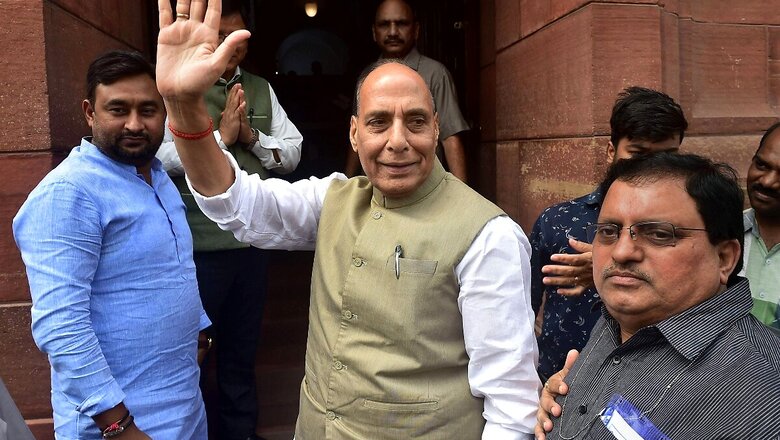
views
In his circle of admirers, defence minister Rajnath Singh is called ‘Ajatashatru’, or the man who has no enemies. Given the nature of politics, this may not be entirely true, but Rajnath Singh has certainly earned admirers in the ongoing Monsoon Session of Parliament. And many of them are in the opposition camp.
Opposition leaders News18 spoke to agree that it’s easy to do business with Singh. They praise his demeanor and the fact that he listens, and doesn’t talk down to anyone.
“We saw it at the business advisory committee meeting of all parties. We were discussing the priority of bills. Instead of telling us what should be done, he asked us what we could do,” said a senior opposition leader.
For many opposition leaders, this is a departure from the brash behaviour of some leaders and negotiators. “He understands the political language and compulsions of parties,” a Congress veteran says.
In the absence of home minister Amit Shah, who is undergoing post-Covid care, the task of floor coordination in Parliament has fallen to one of the senior most ministers of the Narendra Modi government.
Rajnath Singh understands that the opposition is belligerent in complaining that the government does not give them a voice. Yet he did his best to ensure that the opposition found its voice. Credit is due for Rajnath Singh in ensuring a smooth discussion on a topic as complex and sensitive as the India-China standoff in Rajya Sabha, in stark contrast to the scenes witnessed in the Lok Sabha, where the Congress walked out.
In the Upper House, all leaders were allowed to speak and Singh was seen taking notes. He then stood up unruffled, calmly responding to all the interventions. His speech was firm and statesmen-like, much like the persona he has built for himself. After the discussion ended in the Rajya Sabha, the defence minister called up all the senior speakers and thanked them.
Cut to Lok Sabha on Friday, proceedings took an ugly turn following a spat between Minister of State for Finance Anurag Thakur and Congress leader in the Lok Sabha Adhir Ranjan Chowdhury. Thakur blamed Jawaharlal Nehru and Sonia Gandhi during a discussion on an economic bill. Chowdhury responded by calling him a “gadha (donkey)” and “Himachal ka chokra (Himachal boy)”.
Adhir Ranjan Chowdhury appealed to Rajnath Singh to deal with Thakur. After the House adjourned, Singh walked up to Chowdhury and tried to calm him down. “He didn’t need to as most of the politicians don’t bother to. But at least he was decent and it was nice of him to reach out to me,” the Congress leader said.
When the government refused to have a discussion on the China issue, saying it was a sensitive situation concerning national security, the opposition cried foul and cited the example of when Atal Bihari Vajpayee himself allowed discussions on national security issues. It was Rajanth Singh who managed to convince party colleagues that he could manage a controlled discussion in the Rajya Sabha and also get the opposition on board.
Many see a Vajpayee in Rajnath Singh. For others, he projects a Pranab Mukherjee-like persona. In the end, the two could manage to bring the opposition around.
Rajnath Singh shares a good personal rapport with opposition leaders like Ghulam Nabi Azad, Mamata Banerjee and Mulayam Singh Yadav. In fact, what makes Rajnath Singh easily acceptable to the opposition is the way he conducts himself. Never offensive, no personal barbs, and no acrimony. Even during the downright bitter campaigning for 2019 Lok Sabha elections, Singh, who contested from Lucknow, he was never drawn into an ugly war of words.
This strategy has come in handy in Parliament as well; a heavy-weight politician in Uttar Pradesh but low-profile in the Union cabinet. A man of few words and not one to be aggressive in any of them.
Singh gained political heft after his handling of the China discussion in Parliament. Clearly, the defence minister is no more a shy and reticent parliamentarian. Like modern-day avatar of Magadh warrior Ajatashatru, Rajnath Singh has managed to expand his footprint in Parliament.




















Comments
0 comment